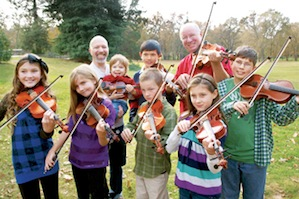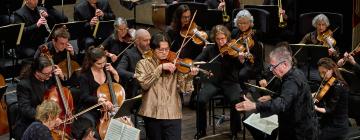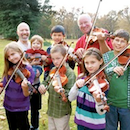
Skip Saturday morning cartoons this week and bring the family to hear young fiddlers bow bluegrass and jazz at the 17th annual fiddlekids concert matinee at the Freight & Salvage in Berkeley.
At the June 28 concert the performers will include youngsters, ages 7 to 14, who will fiddle a variety of Celtic/Irish, swing, jazz, blues, bluegrass, American old-time, southern and Appalachian tunes. The kids will have just finished fiddlekids, a week-long summer day-camp that is part of Freight & Salvage's music education program. As well, the children will perform dances they learned at the camp with instructor Kalia Kliban. Fiddle-related artwork they created during the week with Anna Rainer will be on display.
The annual camp is open to young fiddlers and violinists with at least one year of playing under their belt. While no previous fiddling experience was required to attend the camp, young musicians trained on classical violins faced challenges that are unique to fiddling, according to fiddlekids camp director John Blasquez.
"It's likely that most of the great classical violinists and the great fiddlers have more in common than either may care to admit," said Blasquez, a veteran fiddler, who counts among the string instruments he plays and teaches violin, guitar, mandolin, ukulele, and bodhran. "Those similarities aside, there are significant stylistic differences between classical violin and fiddling."
The essence of fiddling style, said Blasquez in an email, is built partly upon accent patterns and bowing styles. In fiddling the accent pattern is on 2nd and 4th beats, whereas in classical the emphasis is generally on 1st and 3rd. "This makes a world of difference," he said.
"That's swing," said Blasquez. "And it naturally imbues life and fiddling authenticity. It's literally the delightful lilting difference between walking and skipping."
What's more, classical music is played in "straight time" — the written music notation can be interpreted literally. In most bluegrass, Irish, old-time, and jazz, however, adjacent eight notes are usually given lilting long-short interpretation, "That's swing," said Blasquez. "And it naturally imbues life and fiddling authenticity. It's literally the delightful lilting difference between walking and skipping."
Many fiddlekids instructors have taught in the camp for several of summers. The kids have to learn fast and get a solid connection with fiddling and specific tunes, according to Blasquez. For their teachers, he said, "The deeper joy is in helping the kids with that struggle, getting up to speed with the others, and seeing them develop a sense of satisfaction and accomplishment."
Fiddlekids camp instructors performing on stage with the kids this year include Blasquez; Julian Smedley, swing-jazz fiddle ace; Harry Liedstrand, traditional Celtic music expert; and Karen Celia Heil, old-time fiddler.
Nearly half of fiddlekids campers return each year, and some eventually become part of the camp's assistant staff, according to Blasquez. "It's wonderful — kids who know and love the camp become part of what makes it happen." This summer Tembani Abeje and Dana Frankel have moved up from students to assistants, he said.
Fiddlekids has been a program of the Freight & Salvage for five years. The camp's founder Bobbi Nikles transitioned the program from her stewardship to that of the downtown Berkeley concert venue, according to Blasquz: "Fiddlekids was a logical fit for a camp and local outreach program [at F&S] that focuses on youth music education."
A long-time music teacher in the East Bay, Blasquez said he has had many adult violin students who abandoned music after high school or college orchestra because they couldn't make a big musical commitment given the requirements of career, marriage, or child rearing. Then, he said, well into their next decades they grow attracted to fiddling.
"Of those people, I hear of a very common theme. Though they're glad they learned a depth of mastery of their instrument and music literacy, they frequently say they really wished they'd learn musical creativity, the ability to learn by ear, memorize and to improvise, such that they can sit in on a jam session and contribute spontaneously. "
For families who can't make the morning show, grab the kids, and your ukuleles, to play along with ukulele maestro Hiram Bell, who will be performing on the Freight & Salvage stage at 7 p.m. that evening.
17th annual fiddlekids concert at Freight & Salvage
June 28, 11:30 am (door open 11 a.m.), free
Ukulele Play-Along w/ Hiram Bell
Come one, come all ... and bring your ukulele!
$10 advance / $12 door
7:00 p.m. at Freight & Salvage

